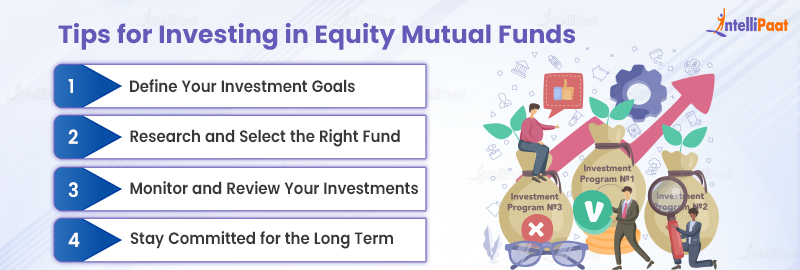Pros and Cons of Investing in Equity Mutual Funds
Equity Mutual Funds are a great way to grow wealth and achieve financial goals. Moreover, with the help of expert fund managers and detailed research, you can rest assured that your investments are in good hands. Discover the pros and cons of investing in equity mutual funds with this blog before making investment decisions.
Table of Contents
- What are Equity Mutual Funds?
- The Pros of Investing in Equity Mutual Funds
- The Cons of Investing in Equity Mutual Funds
- Tips for Investing in Equity Mutual Funds
- Conclusion
What are Equity Mutual Funds?
Equity mutual funds are investment instruments that combine funds from various investors to invest in a diversified portfolio of stocks. Professional fund managers manage these funds and make investment decisions on behalf of the investors. Thus, understanding the fundamental aspects of equity mutual funds is essential before delving into their pros and cons.
These funds are usually classified according to their investment objectives, such as large-cap, mid-cap, small-cap, or sector-specific funds. Each fund follows a specific investment strategy and portfolio makeup, openly disclosed in its prospectus.
The Pros of Investing in Equity Mutual Funds

Investing in the financial market is an avenue that offers various opportunities for individuals to grow their wealth and achieve their financial goals. Some of them are as follows:
- Potential for Higher Returns
One of the primary advantages of investing in equity mutual funds is the potential for higher returns compared to other investment options. Since these funds primarily invest in stocks, they allow investors to participate in the growth potential of different companies and sectors. Over the long term, equity markets have historically provided higher returns than other asset classes like bonds or cash.
Suppose an investor purchases shares of a technology-focused equity mutual fund. If the technology sector experiences substantial growth, the fund’s portfolio value will likely increase, leading to higher returns for the investor. However, it is essential to note that past performance does not guarantee future results, and investing in equity mutual funds involves inherent market risks. - Professional Management
Equity mutual funds are overseen by skilled fund managers with expertise in analyzing stocks, researching market trends, and making well-informed investment decisions. These professionals diligently monitor the performance of the fund’s portfolio, actively manage its holdings, and adjust the allocation according to prevailing market conditions.
Professional management offers a valuable advantage as it allows investors to leverage the expertise and insights of fund managers without the burden of personally selecting and monitoring individual stocks. These professionals research extensively, meticulously evaluate company financials, analyze industry dynamics, and employ effective investment strategies to optimize returns and mitigate risks. - Diversification and Risk Mitigation
Investing in individual stocks can be risky, as the fortunes of a single company can significantly impact the investment’s performance. However, equity mutual funds offer diversification benefits by distributing assets across a range of stocks. This diversification helps mitigate the risk of investing in a single company or sector.
For instance, if an investor puts all their money into a single technology stock and that company experiences a downturn, the entire investment would be at risk. In contrast, an equity mutual fund that holds a diversified portfolio of stocks across various industries would be less affected by the poor performance of a single stock. - Accessibility and Convenience
Investing in equity mutual funds is relatively easy and accessible for individual investors. Most mutual fund companies offer online platforms where investors can easily open accounts, research funds, and make transactions. These platforms provide comprehensive information about the funds, including their investment objectives, historical performance, and fees.
In addition, equity mutual funds enable individuals with varying financial capacities to start investing small amounts of money. Investors can choose from various funds customized to their risk tolerance, investment goals, and timeframes. This extensive selection of options ensures that investors can find funds that best fit their needs.
The convenience of investing in equity mutual funds also applies to the management aspect. After investing, investors can depend on the fund managers to handle the daily operations, such as stock selection, portfolio rebalancing, and administrative duties. This hands-off approach lets investors concentrate on their investment strategy and financial objectives.
The Cons of Investing in Equity Mutual Funds
There are several potential drawbacks to investing in Equity Mutual Funds, and they are elaborated further:
- Market Volatility: Investing in equity mutual funds has a notable disadvantage related to the market’s inherent volatility. The stock market is susceptible to fluctuations, which means that during periods of economic uncertainty or market downturns, the value of equity mutual funds can decline.
This instability can be unsettling for investors, especially those with a low risk tolerance. It is essential to recognize that market downturns are a natural occurrence in the investment cycle, and maintaining long-term investments can help alleviate the impact of short-term volatility.
To illustrate, let’s consider the global financial crisis of 2008, during which equity mutual funds experienced significant declines in value. Nevertheless, investors who remained committed and retained their funds witnessed a recovery and subsequent investment growth over time. - Management Fees and Expenses: Equity mutual funds are managed by professionals who make investment decisions on behalf of the investors. However, this professional management comes at a cost. Mutual funds charge management fees and expenses to cover the costs of research, administration, marketing, and other operational expenses.
It’s crucial for investors to carefully consider these charges and compare them with the potential benefits before investing in a particular fund. However, it’s important to note that paying for professional management can provide value through the expertise and resources that fund managers bring to the table. - Lack of Control and Transparency: Investing in equity mutual funds means placing your trust in the hands of professional fund managers who make investment decisions on behalf of all the investors in the fund. You have limited control over individual stock selection and portfolio decisions as an investor.
The fund manager decides which stocks to buy, sell, or hold based on their investment strategy and research. This lack of control may not sit well with some investors, who prefer a more hands-on investment approach.
Additionally, the transparency of underlying holdings and portfolio changes may vary across funds. Certain investment funds offer comprehensive details regarding their holdings and approach, whereas others may have restricted transparency. - Tax Implications: Investing in equity mutual funds can have tax implications for investors. When fund managers buy or sell stocks within the fund, it may trigger capital gains or losses. If a fund distributes these gains to the investors, they are typically subject to capital gains taxes.
The timing and frequency of these distributions can vary across funds. Investors should know the tax implications and consider the impact on their overall tax planning strategy. It’s advisable to consult with a tax professional to understand the specific tax rules and regulations that apply to your investment in equity mutual funds.
Tips for Investing in Equity Mutual Funds

Below are some of the tips for investing in equity mutual funds:
- Define Your Investment Goals
Before investing in any equity mutual fund, defining your investment goals is essential. Are you looking for long-term growth, income generation, or a combination of both? Clarifying your objectives will help you choose the right fund that aligns with your financial goals and risk tolerance. - Research and Select the Right Fund
Conducting extensive research plays a vital role in the process of choosing an equity mutual fund. Several key factors should be considered, including the fund’s past performance, expense ratio, investment strategy, track record of the fund manager, and the fund’s level of risk. It is important to seek consistency in performance and select a fund that aligns with your specific investment objectives. - Monitor and Review Your Investments
Once you’ve invested in an equity mutual fund, monitoring and reviewing your investments periodically is important. Keep track of the fund’s performance and any changes in its strategy or management, and assess whether it still aligns with your investment objectives. Regular reviews will help ensure that your investments stay on track. - Stay Committed for the Long Term
Investing in equity mutual funds should be approached with a long-term perspective. The stock market experiences short-term fluctuations, but historically, it has shown growth over the long run. Resist the temptation to make impulsive decisions based on short-term market movements. Stay committed to your investment plan and give your investments time to grow and achieve their potential.
Conclusion
Indubitably, investing in equity mutual funds has its advantages and disadvantages. While these funds offer the potential for high returns and diversification of investments, they also involve inherent market risks, fees and expenses, and limited control over investment decisions. It is important to consider these factors carefully and consult with a financial professional before making strategic financial decisions.
The post Pros and Cons of Investing in Equity Mutual Funds appeared first on Intellipaat Blog.
Blog: Intellipaat - Blog
Leave a Comment
You must be logged in to post a comment.







